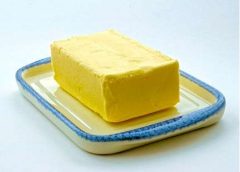
Margarine is a manufactured substitute for butter. The margarine produced in the United States is usually made from corn, cottonseed, or soybean oil. The oils, refined, deodorized, and hydrogenated to the desired consistency, are churned or homogenized, usually with cultured skim milk, then chilled and reworked to incorporate salt and remove excess water. Margarine is similar in composition to butter, yields practically the same number of calories, and is easily digestible. It is commonly fortified with vitamin A and vitamin D.
MARGARINE;
- Is very high in trans-fatty acids.
- Triples the risk of coronary heart disease.
- Increases total cholesterol and LDL (the bad cholesterol), and lowers HDL cholesterol (the good cholesterol).
- Increases the risk of cancers up to fivefold.
- Lowers the quality of breast milk.
- Decreases the immune response.
- Decreases the insulin response.
Recommendation:
The body cannot incorporate trans-fatty acids into membranes, and if it tries to do so, deformed cellular structures may result. Eating trans-fatty acids in margarine probably increases cancer risks, promotes inflammation, and accelerates aging and degenerative changes in tissues. Dr. Andrew Weil, of University of Arizona, College of Medicine, says that he is convinced enough of these possibilities to try to eliminate margarine from his diet.
Margarine is but one molecule away from being plastic. This fact alone is enough to make you want to avoid margarine
When people ask Dr. Weil whether he thinks it is better to eat butter or margarine. He says, the people should rather be asking whether it is worse to eat butter or margarine, because both are concentrated fats that contribute to the unhealthy excess of fat calories that most of us consume. Dr. Weil says that he doesn’t keep either of them in his house. But if he were forced to make a choice, he would take the real thing (i.e., butter) in modest amounts, and he recommends that choice to everyone.
As far as halal aspect of it is concerned, it depends on the company who is manufacturing the margarine. Various flavours go into margarine in small amounts. Flavours may or may not contain alcohol (in small amounts), as flavour carrier or solvent. Unless it is investigated, we cannot say one way or the other. In such case, the golden rule is; “When in doubt, leave it out”.


thanks Mr. Hussaini, after that, I will careful more…
Very beneficial article
Thank you…